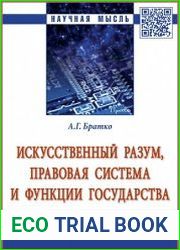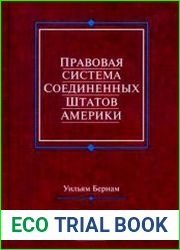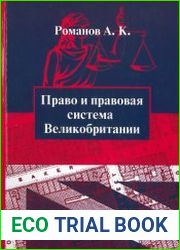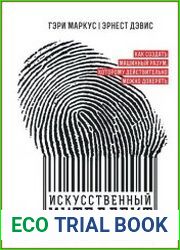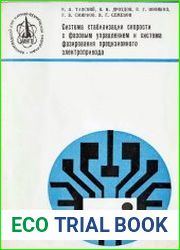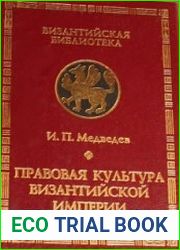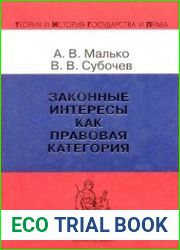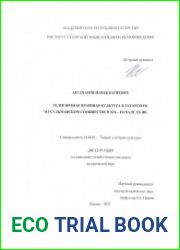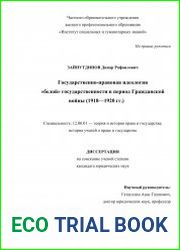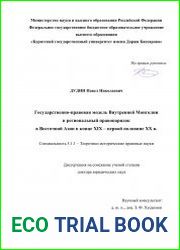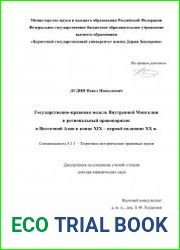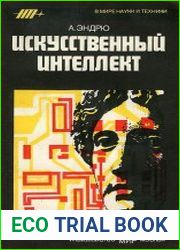
BOOKS - SCIENCE AND STUDY - Искусственный разум, правовая система и функции государст...

Искусственный разум, правовая система и функции государства
Author: Братко А.Г.
Year: 2023
Pages: 283
Format: PDF
File size: 85 MB
Language: RU

Year: 2023
Pages: 283
Format: PDF
File size: 85 MB
Language: RU

Book Description: The monograph "Artificial Intelligence, Legal System, and State Functions" explores the methodological challenges of integrating artificial intelligence into the legal system while considering the societal laws that govern it. The properties of the rule of law as a micro-system within broader legal systems and techniques for consolidating it within the system of legislation are discussed, along with the logic of constructing a distinct and independent legal framework for artificial intelligence that parallels the primary branches of law based on the four-term structure of the legal norm. This book offers a comprehensive analysis of the integration of artificial intelligence into the legal system and its implications for the future of humanity and the unity of nations. Artificial Intelligence, Legal System, and State Functions Introduction: In today's rapidly changing world, technology is advancing at an unprecedented pace, and artificial intelligence (AI) has become an integral part of our lives. From virtual assistants to self-driving cars, AI is transforming how we live, work, and interact with one another. However, as AI becomes more pervasive, questions arise about its role in society and its impact on our legal systems. "Artificial Intelligence, Legal System, and State Functions" delves into these questions and examines the methodological challenges of integrating AI into the legal system while considering the societal laws that govern it.
Монография «Искусственный интеллект, правовая система и государственные функции» исследует методологические проблемы интеграции искусственного интеллекта в правовую систему при рассмотрении социальных законов, которые ее регулируют. Обсуждаются свойства правового государства как микросистемы в рамках более широких правовых систем и техники его закрепления в рамках системы законодательства, наряду с логикой построения внятной и независимой правовой базы искусственного интеллекта, параллельной первичным отраслям права на основе четырехсрочной структуры правовой нормы. Эта книга предлагает всесторонний анализ интеграции искусственного интеллекта в правовую систему и ее последствий для будущего человечества и единства наций. Искусственный интеллект, правовая система и государственные функции Введение: в современном быстро меняющемся мире технологии развиваются беспрецедентными темпами, и искусственный интеллект (ИИ) стал неотъемлемой частью нашей жизни. От виртуальных помощников до самоуправляемых автомобилей, ИИ трансформирует то, как мы живем, работаем и взаимодействуем друг с другом. Однако по мере того, как ИИ становится все более распространенным, возникают вопросы о его роли в обществе и его влиянии на наши правовые системы. «Искусственный интеллект, правовая система и государственные функции» углубляется в эти вопросы и исследует методологические проблемы интеграции ИИ в правовую систему при рассмотрении социальных законов, которые ее регулируют.
La monographie « Intelligence artificielle, système juridique et fonctions publiques » explore les défis méthodologiques de l'intégration de l'intelligence artificielle dans le système juridique lors de l'examen des lois sociales qui la régissent. s caractéristiques de l'État de droit en tant que microsystème dans le cadre des systèmes juridiques plus larges et de la technique de son ancrage dans le système législatif sont discutées, ainsi que la logique de la construction d'un cadre juridique intelligent et indépendant de l'intelligence artificielle parallèle aux branches primaires du droit sur la base d'une structure juridique à quatre volets. Ce livre propose une analyse complète de l'intégration de l'intelligence artificielle dans le système juridique et de ses conséquences pour l'avenir de l'humanité et l'unité des nations. Intelligence artificielle, système juridique et fonctions publiques Introduction : Dans le monde en mutation rapide d'aujourd'hui, les technologies évoluent à un rythme sans précédent et l'intelligence artificielle (IA) est devenue une partie intégrante de nos vies. Des assistants virtuels aux voitures autonomes, l'IA transforme notre façon de vivre, de travailler et d'interagir. Cependant, à mesure que l'IA devient de plus en plus répandue, on s'interroge sur son rôle dans la société et son impact sur nos systèmes juridiques. « Intelligence artificielle, système juridique et fonctions publiques » s'intéresse à ces questions et explore les problèmes méthodologiques de l'intégration de l'IA dans le système juridique en examinant les lois sociales qui la régissent.
La monografía «Inteligencia Artificial, stema gal y Funciones Públicas» explora los retos metodológicos de la integración de la inteligencia artificial en el sistema legal al considerar las leyes sociales que la rigen. Se examinan las características del estado de derecho como microsistema dentro de los sistemas jurídicos más amplios y la técnica de su incorporación en el sistema legislativo, junto con la lógica de construir un marco jurídico de inteligencia artificial inteligible e independiente, paralelo a las ramas primarias del derecho, sobre la base de la estructura cuatrienal del derecho. Este libro ofrece un análisis exhaustivo de la integración de la inteligencia artificial en el sistema legal y sus implicaciones para el futuro de la humanidad y la unidad de las naciones. Inteligencia Artificial, stema gal y Funciones Gubernamentales Introducción: En el mundo actual, que cambia rápidamente, la tecnología evoluciona a un ritmo sin precedentes, y la inteligencia artificial (IA) se ha convertido en una parte integral de nuestras vidas. Desde asistentes virtuales hasta autos autogestionados, la IA transforma la forma en que vivimos, trabajamos e interactuamos entre nosotros. n embargo, a medida que la IA se vuelve cada vez más común, surgen preguntas sobre su papel en la sociedad y su impacto en nuestros sistemas legales. «Inteligencia Artificial, stema Jurídico y Funciones Públicas» ahonda en estas cuestiones y explora los retos metodológicos de la integración de la IA en el ordenamiento jurídico a la hora de abordar las leyes sociales que la regulan.
A monografia «Inteligência Artificial, Ordenamento Jurídico e Funções Governamentais» explora os desafios metodológicos da integração da inteligência artificial no sistema legal ao analisar as leis sociais que a regem. Estão a ser discutidas as propriedades do Estado de Direito como um microssistema dentro dos sistemas legais mais amplos e da técnica de fixação dentro do sistema de legislação, juntamente com a lógica de construir um quadro legal de inteligência artificial racional e independente, paralelo aos setores primários do direito com base na estrutura legal de quatro linhas. Este livro oferece uma análise completa da integração da inteligência artificial no sistema legal e suas consequências para o futuro da humanidade e da unidade das nações. Inteligência artificial, ordenamento jurídico e funções governamentais Introdução: No mundo atual em rápida evolução, a tecnologia evolui a um ritmo sem precedentes, e a inteligência artificial (IA) tornou-se parte integrante das nossas vidas. De ajudantes virtuais a carros autônomos, a IA transforma a forma como vivemos, trabalhamos e interagimos uns com os outros. No entanto, à medida que a IA se torna cada vez mais comum, há questões sobre o seu papel na sociedade e o seu impacto nos nossos sistemas legais. A Inteligência Artificial, o stema Jurídico e as Funções Governamentais aprofundam-se nestas questões e exploram os desafios metodológicos da integração da IA no sistema legal ao analisar as leis sociais que a regem.
La monografia «Intelligenza artificiale, sistema giuridico e funzioni statali» esplora i problemi metodologici dell'integrazione dell'intelligenza artificiale nel sistema legale quando si esaminano le leggi sociali che la regolano. Sono state discusse le proprietà dello stato di diritto come microsistema nell'ambito di sistemi giuridici più ampi e della sua tecnica di fissazione all'interno del sistema legislativo, insieme alla logica di costruire un quadro giuridico dell'intelligenza artificiale forte e indipendente, parallelo ai settori primari del diritto sulla base di una struttura giuridica a quattro righe. Questo libro offre un'analisi completa dell'integrazione dell'intelligenza artificiale nel sistema legale e delle sue conseguenze sul futuro dell'umanità e dell'unità delle nazioni. Intelligenza artificiale, sistema legale e funzioni statali Introduzione: in un mondo in continua evoluzione, la tecnologia sta evolvendo a un ritmo senza precedenti, e l'intelligenza artificiale (IA) è diventata parte integrante della nostra vita. Dagli assistenti virtuali alle auto autosufficienti, l'IA trasforma il modo in cui viviamo, lavoriamo e interagiamo. Tuttavia, mentre l'intelligenza artificiale diventa sempre più comune, ci sono domande sul suo ruolo nella società e sul suo impatto sui nostri sistemi legali. «Intelligenza artificiale, sistema giuridico e funzioni pubbliche» approfondisce queste questioni e esplora i problemi metodologici dell'integrazione dell'intelligenza artificiale nel sistema legale quando si considerano le leggi sociali che la regolano.
Die Monografie „Künstliche Intelligenz, Rechtssystem und staatliche Funktionen“ untersucht die methodischen Herausforderungen der Integration künstlicher Intelligenz in das Rechtssystem bei der Betrachtung der es regelnden Sozialgesetze. Die Eigenschaften des Rechtsstaates als Mikrosystem im Rahmen breiterer Rechtssysteme und die Techniken seiner Verankerung im Rahmen des Rechtssystems werden diskutiert, zusammen mit der Logik des Aufbaus eines kohärenten und unabhängigen Rechtsrahmens für künstliche Intelligenz parallel zu den primären Rechtszweigen auf der Grundlage einer viergliedrigen Struktur der Rechtsnorm. Dieses Buch bietet eine umfassende Analyse der Integration künstlicher Intelligenz in das Rechtssystem und ihrer Auswirkungen auf die Zukunft der Menschheit und die Einheit der Nationen. Künstliche Intelligenz, Rechtssystem und Regierungsfunktionen Einleitung: In der heutigen schnelllebigen Welt entwickelt sich die Technologie in einem beispiellosen Tempo und künstliche Intelligenz (KI) ist zu einem integralen Bestandteil unseres bens geworden. Von virtuellen Assistenten bis hin zu selbstfahrenden Autos verändert KI die Art und Weise, wie wir miteinander leben, arbeiten und interagieren. Mit zunehmender Verbreitung von KI stellen sich jedoch Fragen zu ihrer Rolle in der Gesellschaft und ihren Auswirkungen auf unsere Rechtssysteme. „Künstliche Intelligenz, Rechtssystem und staatliche Funktionen“ geht diesen Fragen nach und untersucht die methodischen Herausforderungen der Integration von KI in das Rechtssystem bei der Betrachtung der es regelnden Sozialgesetze.
''
"Yapay Zeka, Hukuk stemi ve Devlet İşlevleri" monografisi, onu yöneten sosyal yasaları göz önünde bulundurarak yapay zekayı hukuk sistemine entegre etmenin metodolojik zorluklarını araştırıyor. Bir mikrosistem olarak hukuk devletinin daha geniş hukuk sistemleri çerçevesindeki özellikleri ve mevzuat sistemi çerçevesindeki konsolidasyon tekniği tartışılır, Yapay zekanın, hukuk normunun dört dönemlik yapısına dayanan birincil hukuk dallarına paralel, tutarlı ve bağımsız bir yasal çerçeve oluşturma mantığı ile birlikte. Bu kitap, yapay zekanın hukuk sistemine entegrasyonunun ve insanlığın geleceği ve ulusların birliği için etkilerinin kapsamlı bir analizini sunmaktadır. Yapay Zeka, Hukuk stemi ve Devlet Fonksiyonları Giriş: Günümüzün hızla değişen dünyasında teknoloji eşi görülmemiş bir hızla gelişiyor ve yapay zeka (AI) hayatımızın ayrılmaz bir parçası haline geldi. Sanal asistanlardan kendi kendini süren arabalara kadar, AI yaşama, çalışma ve birbirimizle etkileşim biçimimizi dönüştürüyor. Bununla birlikte, AI daha yaygın hale geldikçe, toplumdaki rolü ve yasal sistemlerimiz üzerindeki etkisi hakkında sorular ortaya çıkmaktadır. "Yapay Zeka, Hukuk stemi ve Devlet İşlevleri'bu konuları ele alır ve onu yöneten sosyal yasaları göz önünde bulundurarak AI'yı hukuk sistemine entegre etmenin metodolojik zorluklarını araştırır.
تستكشف دراسة «الذكاء الاصطناعي والنظام القانوني والوظائف الحكومية» التحديات المنهجية لدمج الذكاء الاصطناعي في النظام القانوني عند النظر في القوانين الاجتماعية التي تحكمه. وتناقش خصائص سيادة القانون بوصفها نظاما صغيرا في إطار النظم القانونية الأوسع وأسلوب توحيدها في إطار نظام التشريع، إلى جانب منطق بناء إطار قانوني متماسك ومستقل للذكاء الاصطناعي موازٍ للفروع الأساسية للقانون استنادًا إلى هيكل من أربعة فترات للقاعدة القانونية. يقدم هذا الكتاب تحليلاً شاملاً لدمج الذكاء الاصطناعي في النظام القانوني وآثاره على مستقبل البشرية ووحدة الأمم. الذكاء الاصطناعي والنظام القانوني والوظائف الحكومية مقدمة: في عالم اليوم سريع التغير، تتطور التكنولوجيا بوتيرة غير مسبوقة وأصبح الذكاء الاصطناعي (AI) جزءًا لا يتجزأ من حياتنا. من المساعدين الافتراضيين إلى السيارات ذاتية القيادة، يقوم الذكاء الاصطناعي بتغيير الطريقة التي نعيش بها ونعمل ونتفاعل مع بعضنا البعض. ومع ذلك، مع انتشار الذكاء الاصطناعي، تثار أسئلة حول دوره في المجتمع وتأثيره على أنظمتنا القانونية. يتعمق «الذكاء الاصطناعي والنظام القانوني والوظائف الحكومية» في هذه القضايا ويستكشف التحديات المنهجية لدمج الذكاء الاصطناعي في النظام القانوني عند النظر في القوانين الاجتماعية التي تحكمه.







